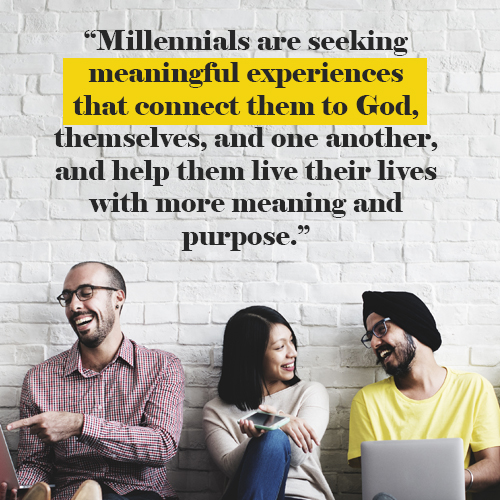How many times have you heard people use the phrase “Young people are the future of the Church”?
It’s kind of a catch-all phrase that taps into us oldies’ deapest fear about church, particularly as the Uniting Church turns 40 this year.
It’s a hard fact to face but church is no longer interesting to young people and there many very good reasons for this. Possibly even too many to talk about here. Let’s face it, church is no longer like it was in our youth.
Research across the Western Christian world tells us that there is a growing cohort of people — from around 18 to 30 — for whom organised religion is something to avoid. In the US they are identified as “nones” and in Australia “spiritual but not religious”.
All of the reasons why we need millennials in churches these days are the reasons why they don’t come to church. Let me explain: The millennial mind is adaptive, craves authenticity, worships innovation and above all, thrives on social change.
So which of these attributes exist in churches that you go to? Perhaps if the answer is “huh?”, and “how does this relate to Christianity?” then there are some things here that may give pause.
Loyalty and adaptation
Much has been written and researched about the fact that millennials are the least religious in around 60 years, but many of these studies by researchers like the Barna Group confirm that there is a robust cohort of people who hunger for spirituality and long to make meaning in their lives. They also crave community connection. And it’s authentic community, the biblical kind that we find in Acts 2, the kind of healthy community that fosters discipleship, relationships and the delight in spending time in each others company.
As Stephanie Vos of The Salt Collective* says, “Millennials are seeking meaningful experiences that connect them to God, themselves, and one another, and help them live their lives with more meaning and purpose.”
The church can and should be that place. In fact there is an imperative to do this. As a church we can wring our hands and push back on this, but there is a real sense that without it, denominational church will possibly die out within a generation.
Authenticity
So much of what we do in church seems to be geared toward ‘doing’ and ‘being’ church in a very specific framework and set of rules. And there are lots of them. In The Uniting Church, one of them would be the Sunday morning “three-hymn sandwich”.
This is where we can learn the most from millennials. They love innovation. What would church look like if we truly engaged 18-30 year olds in church? What if we actually asked them what would they like their experience of church to be?
Again Stephanie Vos has some wisdom here, “Let church be fluid and inclusive, messy and surprising, changed by the people who are there and who haven’t come yet, experimental and real, a place that brings different classes and generations and races and ideas together into conversation and exploration. Millennials are seeking authenticity and vulnerability – they don’t need a big fancy building, they need you to speak into the difficulty of their life and the hope they’re so carefully nurturing. They want belonging that comes from relationships not rosters. And they don’t have the time to wait around to be included.”
Mobile and not afraid of change
To say a millennial can quickly adapt to change is like saying “is the Pope a Catholic?”
This age group deals with constant change and will see the biggest societal change in their lifetimes. They don’t have time to wait around. Us oldies can shrug this off and get grumpy about how rapidly things are changing, but this won’t stop anytime soon. And the age group best evolved to deal with it are the digital natives.
As a result of this change, millennials want to be at the forefront of things that make an impact in the world. Perhaps it is easy to shrug these attitudes off as the marks of “irresponsible youth” that need “instant gratification”, but society and technology has geared them this way and harnessing this aspect of risk-taking and entrepreneurism is exactly what the church needs.
As Vos says, “The church needs to be more nimble, allowing for and designing ways to get millennials plugged in and making a meaningful contribution immediately. This type of energy may attract millennials, but it will serve the church as a whole. How many people are waiting to be included? Hanging on the sidelines, waiting to be invited in?”
Letting go of assumptions
If we crave meaningful experiences this should and can shape the future of the church. But this will only happen if we really seek to collaborate in an authentic way, let go of long held assumptions and notions of what church ‘should’ be, look forward with an attitude that embraces new ideas and let’s experiments unfold. And dare I say it, let the “three-hymn sandwich” go.
As Vos says let’s seek out the attributes of millennials, “sincere engagement, activism, social media fluency, craving for what’s authentic, vulnerability. A desire to make a creative, meaningful, significant impact in their communities.”
At 40, if we’re not willing to have the conversations and take the risks we might be on the endangered species list.
Adrian Drayton
*The Salt Collective features diverse writers who are shaped by and grounded in the spirituality and ethics of the Beatitudes. Together we curate unusual discussions on faith, politics, culture, and media.












